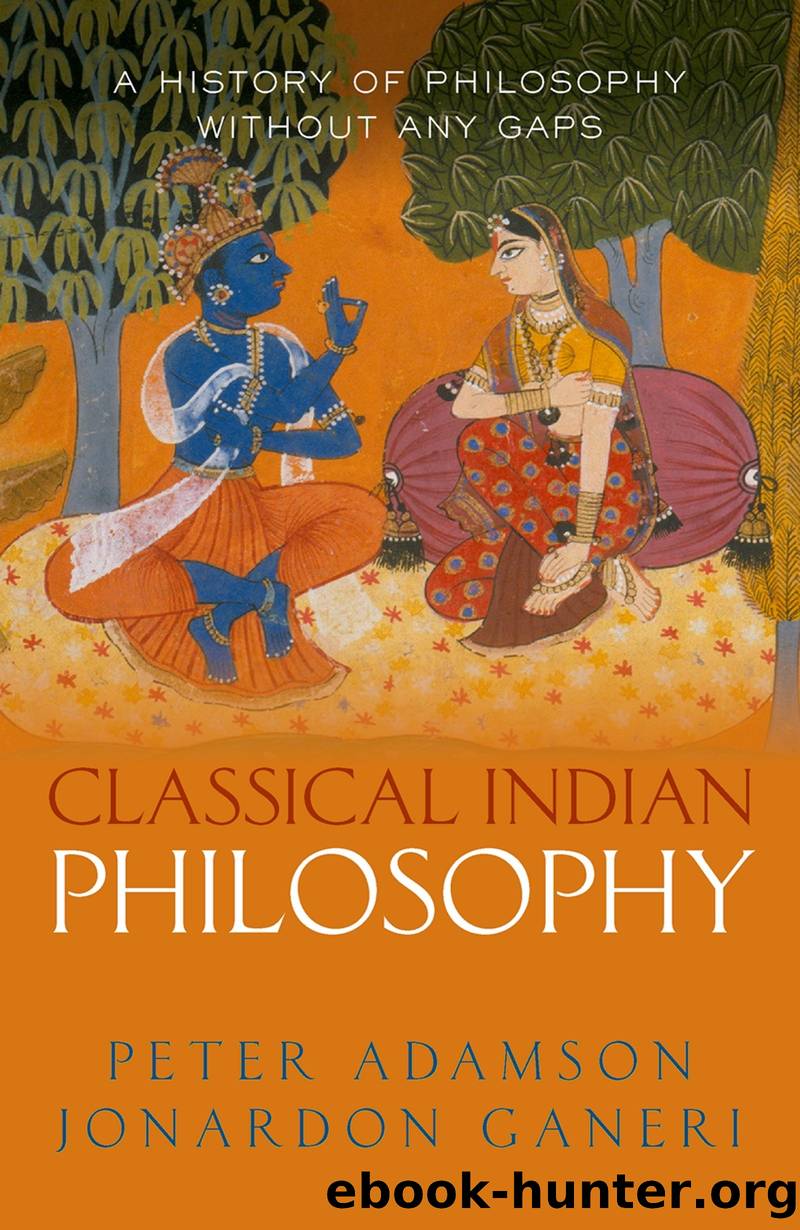Classical Indian Philosophy by Peter Adamson & Jonardon Ganeri

Author:Peter Adamson & Jonardon Ganeri [Adamson, Peter & Ganeri, Jonardon]
Language: eng
Format: epub
ISBN: 9780192592675
Publisher: Oxford University Press
Published: 2019-11-21T00:00:00+00:00
29
Fine-Grained Analysis
Kaṇāda’s Vaiśeṣika-sūtra
The ninth-century Muslim philosopher al-Kindī had some strange ideas about music. It’s reported that he once temporarily cured a young man of apoplexy by having tunes played on a lute, and in his own writings on music he talks about the way that music can affect the soul. Music also expresses the character of the people who play it. This, al-Kindī says, is why different cultures have different numbers of strings on their instruments. So the Greeks, who invented the theory of four elements, played lutes with four strings. As for the Indians, they made do with a single-stringed instrument, to represent their view that the whole world arises from only one cause.1 But we know better. If our survey of the Vedic philosophical schools has taught us anything, it is that all Indian thinkers were not singing from the same hymn sheet. True, the Vedānta school did emphasize the derivation of all things from the one brahman, or even the identity of things with this source, according to Advaita Vedānta. But ancient India had its fair share of pluralists too. The heroes of metaphysical pluralism were to be found in the partner school of Nyāya, who went by the name of Vaiśeṣika.
Śaṅkara, the founder of Advaita Vedānta, scornfully dismissed the Vaiśeṣikas as “semi-nihilists (ardhavaināśika)” because of their failure to ground all things in the true reality of brahman.2 But Vaiśeṣika is actually committed to thoroughgoing realism. Unlike Advaita, it assumes that there is a structured world out there, one that is independent of human conceptions and thought. It is also a world we can understand, in the first instance by offering a classification or division of reality into its various types. This task is undertaken in the founding document of the school, which as you probably don’t need us to tell you is called the Vaiśeṣika-sūtra. It is thought to have been compiled in about the first century ad, though Vaiśeṣika ideas were certainly in circulation much earlier. Its author is Kaṇāda, also known as Ulūka: “the owl.” There are several possible explanations for this nickname. Perhaps it is just based on the name Kaṇāda, which means “grain eater,” like an owl—though it may also be interpreted as meaning “atom eater,” because Vaiśeṣika is committed to atomism. A more fabulous explanation of the name Ulūka is that the whole Vaiśeṣika system was revealed to Kaṇāda by a god who had assumed the form of an owl.
At least as much as other sūtras, the Vaiśeṣika-sūtra is difficult to understand, and since no further explanation was forthcoming from divine owls, the tradition usually turned for clarification to Praśastapāda, who lived in the sixth century ad. In a departure from the usual procedure, he did not compose a formal commentary or bhāṣya but a freestanding treatise, albeit one clearly inspired by the work of Kaṇāda. It becomes the touchstone for later authors, even more so than the sūtra itself, to the point that Wilhelm Halbfass has called Praśastapāda “the most authoritative representative, if not the creator, of the classical Vaiśeṣika.
Download
This site does not store any files on its server. We only index and link to content provided by other sites. Please contact the content providers to delete copyright contents if any and email us, we'll remove relevant links or contents immediately.
The Way of Zen by Alan W. Watts(6586)
Ego Is the Enemy by Ryan Holiday(5400)
The Art of Happiness by The Dalai Lama(4118)
The Book of Joy by Dalai Lama(3964)
Why Buddhism is True by Robert Wright(3438)
Spark Joy by Marie Kondo(3290)
Shift into Freedom by Loch Kelly(3189)
Happiness by Matthieu Ricard(3035)
A Monk's Guide to a Clean House and Mind by Shoukei Matsumoto(2901)
The Lost Art of Good Conversation by Sakyong Mipham(2638)
The Meaning of the Library by unknow(2557)
The Unfettered Mind: Writings from a Zen Master to a Master Swordsman by Takuan Soho(2290)
The Third Eye by T. Lobsang Rampa(2255)
Anthology by T J(2201)
Red Shambhala by Andrei Znamenski(2180)
The Diamond Cutter by Geshe Michael Roach(2056)
Thoughts Without A Thinker: Psychotherapy from a Buddhist Perspective by Epstein Mark(2004)
Twilight of Idols and Anti-Christ by Friedrich Nietzsche(1886)
Advice Not Given by Mark Epstein(1873)
